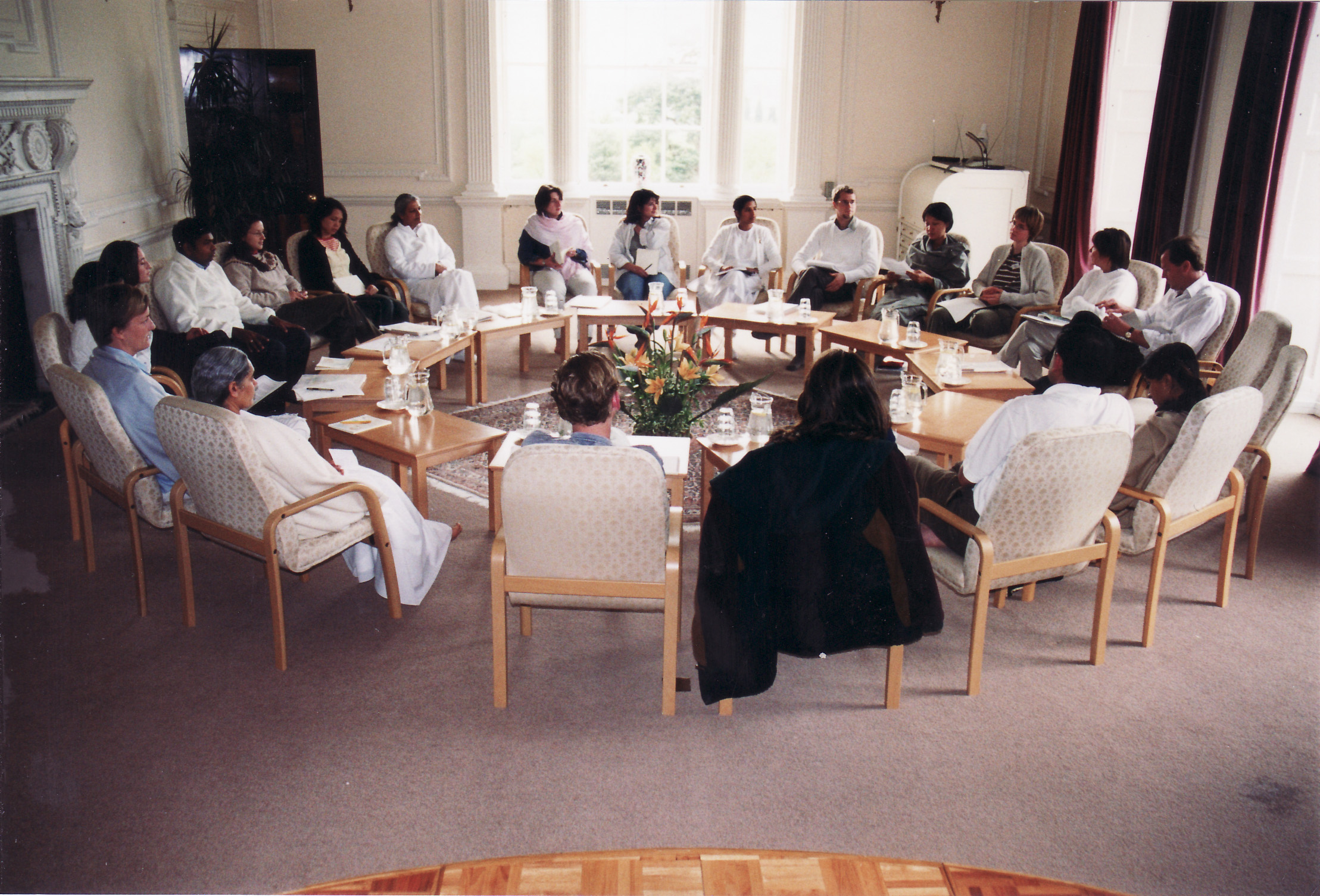By Peter Senge
IT IS TRAGIC THAT PEOPLE TO WHOM we give a fair amount of responsibility for our societies and for our social well-being rarely ever get to have real conversations where they can talk honestly about their hopes, their fears, their concerns, their personal dilemmas -- the kind of conversations that all of us rely upon for a sense of connection when we are dealing with difficult things. The consequence is people who we look up to and count on are very isolated as human beings, and I think they suffer a great deal. We don't tend to think of them as suffering, because we see them as powerful. Yet, when we are around them, we can immediately feel all the constrictions they carry.
This is why we in the SoL (Society for Organizational Learning) community have gatherings like the Executive Champion Workshops, where leaders gather for honest conversation. Last August we had such a gathering in a place where we have convened many times before -- in Stowe, Vermont. In Stowe we erect a large tent in a beautiful field looking out at the mountains of Northern Vermont. It is an extraordinarily peaceful setting. One of the participants in this meeting last summer was Mieko Nishimizu, a vice president of the World Bank for South Asia, a position she has held for about six years.
Over the course of several days together we spoke about the Kyoto Protocols. Mieko said, "You know the Kyoto Protocols are not perfect. They do have flaws. If you had been in the meetings that produced the Kyoto Protocols, you would understand why they have flaws."
This led her to talk about the difficulties of bringing political leaders together, when they have to really think together, and the failures surrounding these attempts. Then she just leaned back on her chair, looked up at the tent we had been meeting in for three days, and said, "If we had been able to have the meeting in a tent, it might have been different."
Mieko believes it is very important to create "safe spaces" for the political leaders to meet. I think certainly you can extend this to other forms of leaders -- to all of those who are in significant positions of formal authority and who make decisions that impact a lot of people. They are very much constrained in being able to serve, since they lack the opportunity for real conversation. The lack of an opportunity among our leaders for real conversation and meaningful connection affects the kinds of decisions they make.
The decisions we get out of our current political decision-making processes are often simply compromises that everybody can live with. They are often one party's will imposed on everybody else. As people in these kinds of meetings come to realize that they really don' t have political clout, they just try to negotiate to get a little bit of their interest included. As a result, they never get to the real possibilities. It is always a process of reducing, and we, the global public, end up with less than we could have.
Imagine if leaders could come together around important decisions in conversations that expand the possibilities, conversations filled with insights, ideas, and fresh perspectives. They might find themselves making decisions that nobody would have anticipated. When you really have something creative happening, it is a building process. In a sense, it comes down to the simplest definition of good conversation versus bad conversation. Good conversations are engaging. Time slows down. You really feel the meaningfulness at a very personal level. In the end, something emerges that wasn't there before you started. Contrast that with decision-making meetings where something is on the table even before you start, and collectively you whittle it down so that everybody can live with it.
There is one other aspect about decision-making meetings that I think about often: we get too obsessed with the outcome, with producing high quality decisions. All decisions are flawed and incomplete. They are the best we can do at the time. The important issue is how can we go about implementing and learning going forward. The real crux of any decision-making process is to get headed in a direction that has possibility. And then, if we are open, and if we do have some trust among the group, we start to tap into our collective intelligence. If decision-making were to happen as part of an ongoing conversation, then the learning process might take place in the course of our making a decision. Then we might notice that the conversation has taken us to an entirely different place, and realize, "This is not what we thought before. We were working with the wrong assumptions."
We would be open to seeing that, but of course exactly the opposite happens in most decision-making. People have their personal egos and their public personas invested in the decision, which means that they can't say that it was a bad decision. I think most of the harm comes from that dynamic. It is not the decision-making dynamic, but it is the attachment to appearances and the absence of a learning dynamic that most limit our progress in decision-making.
Look at your personal life. I think that most of the decisions I have made in my life were wrong. Few things turned out the way I expected them to. But once I notice that, I can say, "That's interesting. Let's make an adjustment here." That is the way living systems work; they are always in an adjusting process, and yet that is not what we get at all in most decision-making processes. If we thought of our decision-making as part of an ongoing learning process, it would be easier for us to acknowledge uncertainty and error and unintended consequences.
I think the principles and the process we use for the Call-of-the-Time Dialogues could be very relevant here. Imagine if, before any scheduled decision-making meeting, people were invited to a half-day session for honest conversation, reflection, and personal connection with others like themselves. I personally think there is no reason to be too conservative or tentative in offering such a session. I think people are wide open to direct experience of deeper awareness and to spiritual reflection as long as you are up-front about it. If people understand they are going to spend a half-day with some time of quiet, some type of meditation, and a chance to begin to talk more openly with others, completely off the record, I think they would be grateful.
People understand the failing of the current approaches and the consequences of not really being able to talk honestly. Imagine if we found a way to be able to respond to opportunities as they develop, so that when a meeting is going to occur, we could arrange for those involved to set aside a half day at the beginning of the meeting to come together and really just be together. It would be a shock to the system. It would take a little getting used to, but imagine what might happen if people started to get used to having this safe space in which to prepare for their meetings. They would come to expect it. They would be able to plan on having some quiet time up front to get to know each other, a chance for completely confidential, off-the-record conversation.
Of course this might be difficult for those in a negotiating mode, because everyone's mind would be racing with what they are going to have to give up in order to get what they want. They might be concerned that talking honestly might make them feel as if they were making themselves vulnerable prior to their negotiation. It would be like two fighters who decide they are going to hug a lot before they get into the ring to fight! They prefer to hate each other. They want to work up animosity toward each other, to work up a kind of competitiveness.
On the other hand, particularly if they were in a setting where there is a larger collective aim such as that of the Kyoto Protocols, safe space would provide enormous benefit. In situations such as these, people arrive with a concern about their national sovereignty and the potential cost to their country, but there is a transcendent goal that they really do agree to. We all know we need to do something about carbon dioxide going up into the atmosphere and about other aspects of global climate change, and we know that it has to be done collaboratively.
So that was Mieko's idea, and that is why she thought it was important. She was not exactly sure of the best way to do it. It has to be with real people in real settings, which is why she reacted positively to the spacious tent in the big field in the mountains. It can't be in artificial settings. I think the only thing to consider is who and when to do it, and how to do it in a way that there is a greater likelihood of its being successful. The most important part of the idea is what might happen if a norm begins to develop so that for certain types of meetings, people start to anticipate that there will be an advance meeting in a safe space. I think this would come to be a reinforcing process for more effective and more meaningful decision-making.





